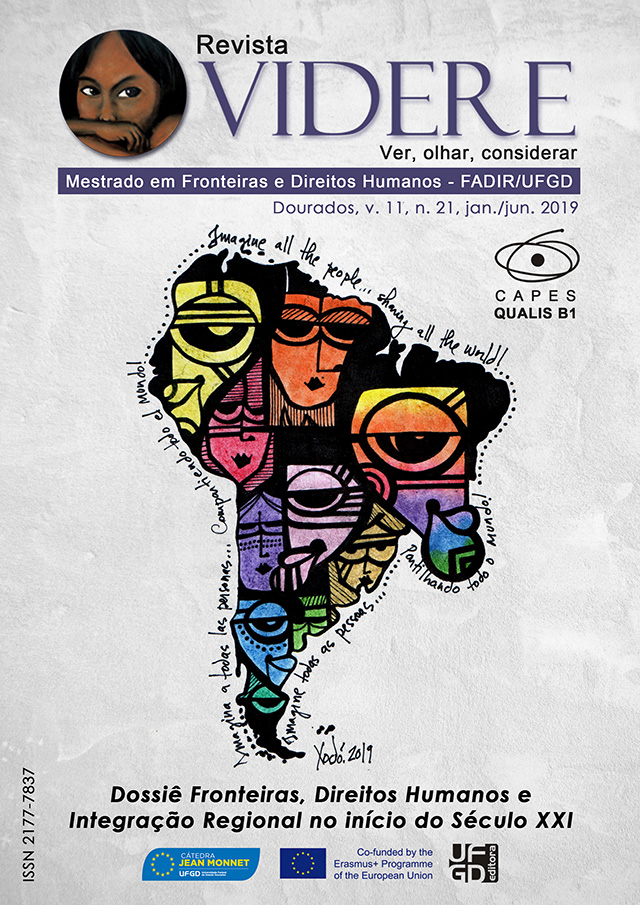Os marcos do novo constitucionalismo latino-americano à luz do Estado Plurinacional da Bolívia
DOI:
https://doi.org/10.30612/videre.v11i21.9571Keywords:
Bolívia. Políticas Públicas. Constitucionalismo Latino-Americano. Povos Originários.Abstract
A dinâmica política dos países latino-americanos, é extremamente complexa. Tal desenvoltura deve-se à ampla gama de povos e culturas que compartilham do mesmo ambiente humano, trocando experiências e modos de vida diversificados. Os povos originários principalmente, encontram na Bolívia um momento de forte impacto de políticas públicas oriundas do novo momento constitucional que o país enfrenta desde a promulgação de sua mais recente Constituição (2009). Assim, a partir de uma metodologia hipotético-dedutiva, análise bibliográfica e constitucional desse Estado, o presente estudo dedica-se a apontar os marcos do constitucionalismo latino-americano com foco específico sobre o Estado Plurinacional da Bolívia. Os resultados apontam essencialmente para um protagonismo crescente desses indivíduos tradicionais, por intermédio de políticas públicas de incentivo à participação política e assistência jurídica representativa de sua cultura e cosmovisão.Downloads
References
DALMAU, Rubén Martínez. Análisis Crítico del Derecho Constitucional desde la Perspectiva del Nuevo Constitucionalismo Latinoamericano. THĒMIS-Revista de Derecho 67, p. 49-62, 2015.
ESTADO PLURINACIONAL DA BOLÍVIA. Constitución Política del Estado (CPE), promulgada em 7 de fevereiro de 2009.
FERNANDES, Bernardo. A Teoria da Constituição à luz dos movimentos do Constitucionalismo (Moderno), Neoconstitucionalismo (Contemporâneo), Transnacionalismo (Latino-Americano) e Constituição Plurinacional. In: O novo Constitucionalismo Latino-americano: o debate sobre novos sistemas de justiça, ativismo judicial e formação de juízes. MORAIS, José Luis Bolzan; BARROS, Flaviane de Magalhães (Coord.). Ed. Arraes, 2014.
GARGARELLA, Roberto. El constitucionalismo latinoamericano y la “sala de máquinas” de la Constitución (1980-2010). Gaceta Constitucional N° 48, 2012.
GARGARELLA, Roberto. El nuevo constitucionalismo latinoamericano: Promesas e interrogantes, 2009. Disponível em: http://www.palermo.edu/Archivos_content/derecho/pdf/Constitucionalismo_atinoamericano.pdf. Acesso em 28 de janeiro de 2019.
MAMANI, Juan. Nuevo constitucionalismo social comunitário desde America Latina. In: O novo Constitucionalismo Latino-americano: o debate sobre novos sistemas de justiça, ativismo judicial e formação de juízes. MORAIS, José Luis Bolzan; BARROS, Flaviane de Magalhães (Coord.). Ed. Arraes, 2014.
MOSIÑO, Eric Cícero Landívar. Indigenismo e Constituição na Bolívia: um enfoque desde 1990 até os dias atuais. In: O constitucionalismo democrático Latino-Americano em debate: soberania, separação de poderes e sistema de direitos. AVRITZER, Leonardo; GOMES, Lilian Cristina Bernardo; e outros. (Org.). 1ª ed., Belo Horizonte: Ed. Autêntica, 2017.
PASTOR, Roberto Viciano; DALMAU, Rubén Martínez. El nuevo constitucionalismo latinoamericano: fundamentos para una construcción doctrinal. Revista General de Derecho Público Comparado 9, 2011.
UGARTE, Pedro Salazar. EL NUEVO CONSTITUCIONALISMO LATINOAMERICANO (UNA PERSPECTIVA CRÍTICA). In Constitucionalismo contemporáneo: Homenaje a Jorge Carpizo. PÉREZ, Luis Raúl González e VALADÉS, Diego (Coord). Cidade do Máxico: Universidade Nacional Autónoma de México, p. 345 a 387.
VIEIRA, José Ribas; DYNIEWICZ, Letícia Garcia Ribeiro. O Estado Plurinacional na América Latina: diálogo conceitual entre multiculturalismo canadense e teoria pós-colonial. In: Novo Constitucionalismo Latino-Americano: o debate sobre novos sistemas de justiça, ativismo judicial e formação de juízes. Belo Horizonte: Arraes Editora, 2014.
Downloads
Published
How to Cite
Issue
Section
License
Authors must accept the publication rules when submitting the journal, as well as agree to the following terms:
(a) The Editorial Board reserves the right to make changes to the Portuguese language in the originals to maintain the cultured standard of the language, while respecting the style of the authors.
(b) Authors retain the copyright and grant the journal the right to first publication, with the work simultaneously licensed under the Attribution-NonCommercial-ShareAlike 3.0 Brazil (CC BY-NC-SA 3.0 BR) that allows: Share - copy and redistribute the material in any medium or format and Adapt - remix, transform, and create from the material. CC BY-NC-SA 3.0 BR considers the following terms:
- Attribution - You must give the appropriate credit, provide a link to the license and indicate whether changes have been made. You must do so under any reasonable circumstances, but in no way that would suggest that the licensor supports you or your use.
- NonCommercial - You may not use the material for commercial purposes.
- Sharing - If you remix, transform, or create from material, you must distribute your contributions under the same license as the original.
- No additional restrictions - You may not apply legal terms or technological measures that legally restrict others from doing anything that the license permits.
(c) After publication, authors are allowed and encouraged to publish and distribute their work online - in institutional repositories, personal page, social network or other scientific dissemination sites, as long as the publication is not for commercial purposes.



















